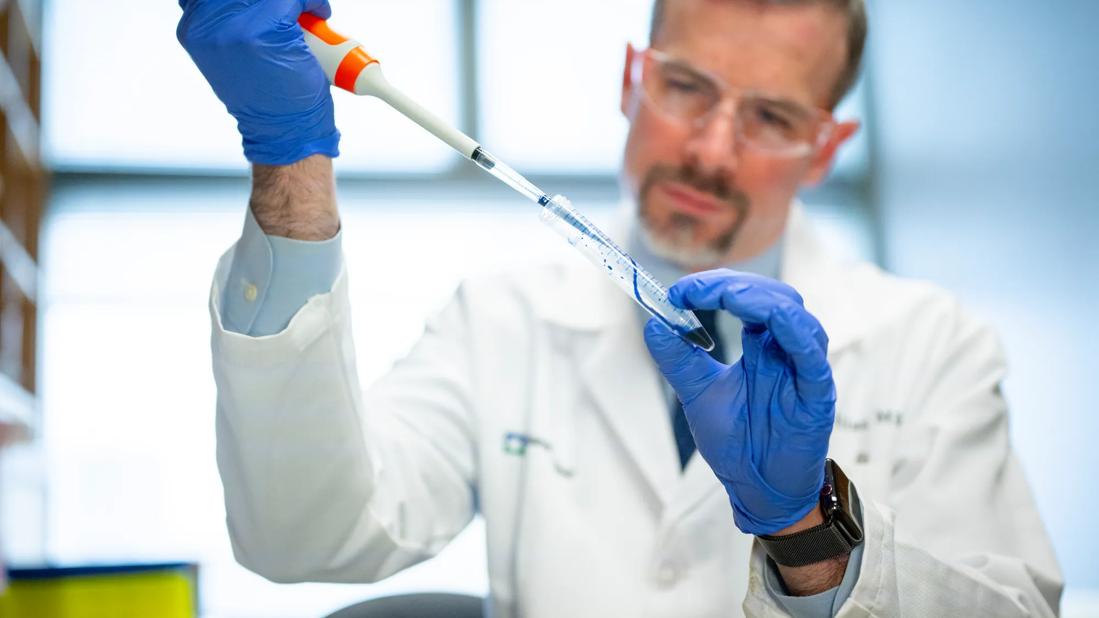Developing and delivering the care most needed by patients, now

Gynecologic cancers, including endometrial and ovarian cancers, are a leading cause of cancer-related deaths in women. The ability of gynecologic tumors to adapt to and evade treatment is a major factor contributing to the poor outcomes that many patients face. The Center for Research Excellence in Gynecologic Cancer (CREGC) is a collaborative network for the development of a comprehensive research program to promote the translation of basic science investigation into the clinic.
Advertisement
Cleveland Clinic is a non-profit academic medical center. Advertising on our site helps support our mission. We do not endorse non-Cleveland Clinic products or services. Policy
The center’s co-directors, Ofer Reizes, PhD, Department of Cardiovascular & Metabolic Sciences and the Cancer Impact Area, Lerner Research Institute, and Peter Rose, MD, Department of Gynecologic Oncology, Gynecologic Oncology & Women’s Health Institute, believe the CREGC is exceptionally positioned to change the landscape of gynecologic cancer research and care.
The center will capitalize on the expertise and patient volume of Cleveland Clinic’s Department of Gynecologic Oncology, which is recognized nationally by U.S. News & World Report for its clinical prowess. Additionally, Lerner Research Institute already has a portfolio of gynecologic cancer research underway.
Through core resources and an infrastructure designed to promote collaboration and accelerate translational medicine, the CREGC supports research projects that explore possible causes of and treatments for a range of gynecologic cancers, including:
“We are really driving research at the bench to care at the bedside, ensuring that our research informs clinical care and vice versa,” states Dr. Reizes. “Our aim is to create tangible benefits for patients by bringing together lab scientists with front-line physicians to focus on the advances most needed by patients, now.”
Advertisement
In addition to supporting specific research projects, the CREGC will help drive research and cures by developing a shared biorepository of patient samples and establishing patient-derived disease models for preclinical investigation of new therapies. In 2018, the CREGC established a process for and successfully engrafted primary tumors for future testing. In the coming months, the group will focus on expanding its tissue and specimen collection and explore the utilization of patient-derived xenograft models in clinical practice.
“Opportunities for breakthroughs in gynecologic cancer are in the team we’ve built,” Dr. Reizes says. “Bringing together a multidisciplinary team to focus on this problem makes me hopeful that we will move the needle on these diseases.”
In addition to the CREGC’s efforts, Cleveland Clinic’s Gynecologic Oncology Cancer Program offers patients the latest in gynecologic cancer management, including the newest drug therapies. “As part of NRG Oncology, an international cooperative research group funded by the National Cancer Institute and National Institutes of Health, we can offer patients who qualify access to investigational treatments through a wide range of clinical trials,” states Dr. Rose. “Additional studies give eligible patients access to other new treatments under investigation in the CREGC, such as hyperthermic intraperitoneal chemotherapy or ‘HIPEC’.”
The Gynecologic Oncology Cancer Program also offers minimally invasive surgery, sophisticated radiation therapy techniques and specialized imaging.
Advertisement
“Our team of highly trained specialists—including gynecologic pathologists, radiation oncologists, nurse practitioners, physician assistants, nurse navigators, chemotherapy coordinators, genetic counselors and social workers—works with patients to provide precise diagnosis, exacting surgical skill and leading-edge therapies,” Dr. Rose notes. “Throughout the entire patient experience, we emphasize comfort and empathy.”
Advertisement
Advertisement

First full characterization of kidney microbiome unlocks potential to prevent kidney stones

Researchers identify potential path to retaining chemo sensitivity

Large-scale joint study links elevated TMAO blood levels and chronic kidney disease risk over time

Investigators are developing a deep learning model to predict health outcomes in ICUs.

Preclinical work promises large-scale data with minimal bias to inform development of clinical tests

Cleveland Clinic researchers pursue answers on basic science and clinical fronts

Study suggests sex-specific pathways show potential for sex-specific therapeutic approaches

Cleveland Clinic launches Quantum Innovation Catalyzer Program to help start-up companies access advanced research technology